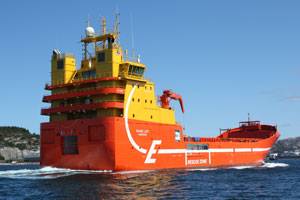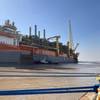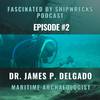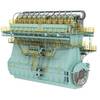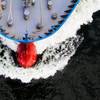Wärtsilä Role in FellowSHIP Project
Wärtsilä has been assigned overall responsibility for systems integration in the pioneering FellowSHIP project. Wärtsilä's specially designed equipment is being used to integrate and create synergies between marine technology and state-of-the-art fuel cell technology. The equipment has been installed onboard the platform supply vessel Viking Lady for extensive sea tests. The innovative solution is seen as being an important contributor in the development of environmentally sustainable marine propulsion systems.
The FellowSHIP project is a joint industry research and development project managed by Det Norske Veritas. It aims to develop and demonstrate hybrid fuel cell power packs, especially suited for marine and offshore use. The power pack will be used as an auxililiary power source on the Viking Lady, which is owned by Eidesvik Offshore, Norway. The ship has been designed by Wärtsilä Ship Design, and its main engines and power drives have also been supplied by Wärtsilä. Wärtsilä's electrical & automation business unit in Norway has custom developed the power electronics needed to connect the fuel cell to the ship's electrical network, and Wärtsilä has, therefore, the important role of being the systems integrator for the FellowSHIP project.
Wärtsilä's electro & automation business unit specializes in designing and developing technologies related to electrical distribution, controls and power converter applications.
"For the FellowSHIP project, Wärtsilä has developed the power electronics, and the systems for regulating and distributing energy from the fuel cell to the electrical network. We have also delivered the distribution and control systems," said Ingve Sørfonn, Project Manager and Director R&D, Wärtsilä Ship Power Technology.
In May, the 320 kW fuel cell, produced by MTU Onsite Energy GmbH, a member of the German Tognum Group, arrived at Stord in Norway. Here it has been integrated together with Wärtsilä's technology, and tested. During this land testing all operational modes, shut down conditions, and dynamical behaviour have been tested and verified in accordance with the specifications.
The fuel cell technology is designed to increase efficiency and leads to a considerable reduction in emissions. Fuel cell technology of this power size has never before been installed in merchant vessels, and the highly innovative project is unique on a world scale. Wärtsilä has been involved in fuel cell technology since the mid-1990s and specializes in systems integration.
The partners in the FellowSHIP project include Wärtsilä, Eidesvik, Det Norske Veritas and MTU Onsite Energy GmbH. The project is supported by the Norwegian Research Council, Innovation Norway, and the German Federal Ministry of Economics and Technology.
(www.wartsila.com)



